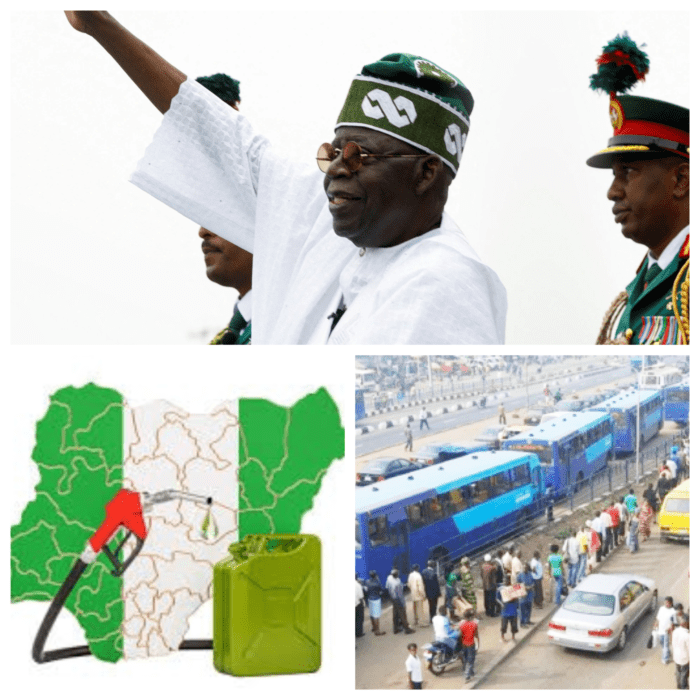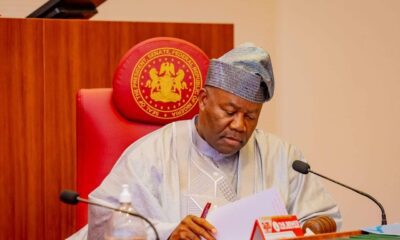National Issues
Removal Of Subsidy On PMS: Where Is The Much-Touted Human Face? -By Isaac Asabor
In a statement, Obaseki said the state government has reduced the number of work days that civil and public servants would have to commute to their workplaces from five days a week to three days a week, among other measures.

There is no denying the fact that in April 2023, prior to the inauguration of the ongoing Bola Ahmed Tinubu-led administration that top decision-makers in Nigeria’s energy industry began preparation for the removal of subsidy on Premium Motor Spirit (PMS), otherwise known as petrol. During the period under reference, the Federal Government assured that the policy, when implemented, will have a human face.
Against the foregoing backdrop, the Permanent Secretary, Ministry of Petroleum Resource, Amb. Gabriel Aduda, while reacting to concerns over the continued regulated downstream oil sector, stated that a lot of consideration was on the ground to buffer what may be a possible shock with subsidy removal.
It will be recalled that President Muhammadu Buhari suspended that part of the Petroleum Industry Act (PIA) for 18 months, and effectively expired in June, this year.
According to Aduda, “Subsidy removal is one that has been with us for a long time and I want to tell you that my minister is taking it very seriously, and all of us in the industry because we totally understand the importance of the removal of subsidy.
“But we also understand the greater importance of the citizens in the scheme of things. And as we speak, we’re still taking a very close look at how best to achieve subsidy without disrupting the entire ecosystem of livelihoods in Nigeria because that is our responsibility as government.”
According to him, buffers need to be put in place to ensure that forex is made available for those that will do imports as well as some form of reinforcements where needed.
“There is quite a lot we need to put in place. And we also have to ensure that supplies are available for a minimum of six months ahead to ensure that, if we finally do that, the disruptions will be minimal.
“When looking at all of that, there are quite a number of factors that we need to look at. But yes, the government is committed to removal, but we can’t be too specific until all the indices have been considered to ensure that the effect is not too hard on the average Nigerian,” he added.
Ostensibly to continue from where his predecessor stopped as promised for the umpteenth time during his campaign ahead of the presidential election that was held on February 25, 2023, Nigeria’s new President Bola Ahmed Tinubu on the day of his inauguration announced the removal of fuel subsidy to the consternation of not a few Nigerians, and having known the impoverishing fallout on the people, he resorted to calming down agitated nerves by saying that though the removal would impose an extra burden on citizens, the shock would be eased by freeing up money for education, regular power supply, transport infrastructure, and healthcare.
He said, “I admit that the decision will impose an extra burden on the masses of our people. Being his first public comment since announcing the petrol subsidy removal after his swearing-in on May 29, Tinubu appealed that Nigerians should bear the decision to “Save our country from going under”.
He further assured, “The government I lead will repay you through massive investment in transportation infrastructure, education, regular power supply, healthcare, and other public utilities that will improve the quality of lives.”
Despite the passion and measured assurance with which the human face that would presage and characterize the removal of fuel subsidy was talked about, it is highly disappointing that the implementation of the policy is worsening the country’s economic crisis, causing immense hardship to the masses.
The retrogressive situation, since the inauguration of the new government under the leadership of Tinubu, has no doubt posed a grave concern to not a few Nigerians as they continue to witness, by each passing day, biting hardship even as the government has been unrelenting in pushing people further into poverty.
For instance, the Federal Inland Revenue Service (FIRS) on Monday announced a new move by the Nigerian government to introduce Value Added Tax in the informal sector, through a scheme dubbed VAT Direct Initiative (VDI).
The federal tax agency said in a statement that the government aims to also use the VDI to curb multiple taxations in the sector.
To achieve its aim, the agency said it will partner with the Market Traders Association of Nigeria (MATAN) to collect and remit VAT from their members especially those in the informal sector using a unified systems technology.
Given the foregoing backdrop, it will not be out of place to urge the government to put measures in place towards the provision of even minimal safety nets for those who are already living on an economic cliff edge and who will suffer the most from these retrogressive policies.
While the elite is largely protected from financial harm, those living in or near poverty are bearing the brunt of major price rises and increasingly tight monetary policies. The reason behind this contextual advocacy is to let the government do something towards ameliorating the biting hardship in the land, and at the same time remind the government that since the removal of the fuel subsidy Nigerians have been facing a massive increase in the cost of petrol prices. Without resorting to sounding exaggerative in this context, it is expedient to say that since the removal of the fuel subsidy that people have been groaning under the weight of soaring food prices even as transport fares charged by road transporters have quadrupled.
To anyone that has been listening to the federal government’s representatives, and looking up to them in high hope, such as the Permanent Secretary of the Petroleum Ministry, there is no denying the fact that his hope has been dashed with the announcement of the removal of petroleum subsidy. One would have expected the federal government to remove the subsidy with a human face but was never done. Even at that, having removed the subsidy, the pragmatic ameliorative effort would have been put on the ground by the federal government to ease the pain caused by subsidy removal.
However, it is some state governments that cared for the people in this regard, not the federal government that is flagging the ship of subsidy removal.
For instance, the Borno State Governor, Babagana Umara Zulum, on Tuesday, July 4, 2023, released 80 buses and pick-up vans for free transportation of farmers from their communities to farmlands.
As gathered, the 80 means of transport will comprise 50 luxurious buses to be allocated from the fleet of the Borno Express Corporation, a state-owned transport company, while the state 30 pick-up vans will be hired and provided by the state government.
In the same vein, the Edo State Governor, Mr. Godwin Obaseki, has earlier empathized with the people of the state in the wake of the rise in prices of goods and services and overall cost of living occasioned by the fuel subsidy removal by the federal government, announced measures to ameliorate the sufferings currently faced by the people as a result of the policy.
In a statement, Obaseki said the state government has reduced the number of work days that civil and public servants would have to commute to their workplaces from five days a week to three days a week, among other measures.
The statement read: “In the wake of fuel subsidy removal by the Federal Government, fuel prices have increased astronomically leading to a rise in prices of goods and services and overall cost of living.
“The Edo State government shares the pains of our people and wants to assure everyone that we are standing with them in these very challenging times.
“We want to reassure our people that we will do all within our powers as a sub-national government to reduce the pains and ameliorate the sufferings our people are currently facing due to the current realities.”
The governor further noted, “As a proactive government, we have since taken the step to increase the minimum wage paid to workers in Edo State from the approved N30,000 to N40,000, the highest in the country today.
Nevertheless, to reduce the high cost of living caused by the withdrawal of fuel subsidy, some governors have initiated safety nets to ameliorate the plight of citizens in their states.
Be that as it may, it is expedient to ask, “Where is the much-touted human face promised, ahead of the removal of the subsidy on PMS?


















